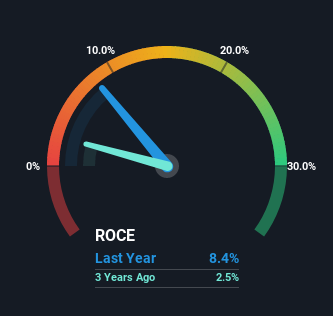- Israel
- /
- Industrials
- /
- TASE:DISI
Discount Investment (TLV:DISI) Is Doing The Right Things To Multiply Its Share Price

There are a few key trends to look for if we want to identify the next multi-bagger. One common approach is to try and find a company with returns on capital employed (ROCE) that are increasing, in conjunction with a growing amount of capital employed. Put simply, these types of businesses are compounding machines, meaning they are continually reinvesting their earnings at ever-higher rates of return. With that in mind, we've noticed some promising trends at Discount Investment (TLV:DISI) so let's look a bit deeper.
What Is Return On Capital Employed (ROCE)?
Just to clarify if you're unsure, ROCE is a metric for evaluating how much pre-tax income (in percentage terms) a company earns on the capital invested in its business. The formula for this calculation on Discount Investment is:
Return on Capital Employed = Earnings Before Interest and Tax (EBIT) ÷ (Total Assets - Current Liabilities)
0.084 = ₪2.1b ÷ (₪33b - ₪7.8b) (Based on the trailing twelve months to September 2022).
Thus, Discount Investment has an ROCE of 8.4%. In absolute terms, that's a low return but it's around the Industrials industry average of 7.5%.
View our latest analysis for Discount Investment

While the past is not representative of the future, it can be helpful to know how a company has performed historically, which is why we have this chart above. If you'd like to look at how Discount Investment has performed in the past in other metrics, you can view this free graph of past earnings, revenue and cash flow.
What Can We Tell From Discount Investment's ROCE Trend?
Discount Investment's ROCE growth is quite impressive. The figures show that over the last five years, ROCE has grown 107% whilst employing roughly the same amount of capital. Basically the business is generating higher returns from the same amount of capital and that is proof that there are improvements in the company's efficiencies. It's worth looking deeper into this though because while it's great that the business is more efficient, it might also mean that going forward the areas to invest internally for the organic growth are lacking.
In Conclusion...
In summary, we're delighted to see that Discount Investment has been able to increase efficiencies and earn higher rates of return on the same amount of capital. Astute investors may have an opportunity here because the stock has declined 58% in the last five years. So researching this company further and determining whether or not these trends will continue seems justified.
One final note, you should learn about the 2 warning signs we've spotted with Discount Investment (including 1 which is a bit concerning) .
While Discount Investment may not currently earn the highest returns, we've compiled a list of companies that currently earn more than 25% return on equity. Check out this free list here.
If you're looking to trade Discount Investment, open an account with the lowest-cost platform trusted by professionals, Interactive Brokers.
With clients in over 200 countries and territories, and access to 160 markets, IBKR lets you trade stocks, options, futures, forex, bonds and funds from a single integrated account.
Enjoy no hidden fees, no account minimums, and FX conversion rates as low as 0.03%, far better than what most brokers offer.
Sponsored ContentNew: Manage All Your Stock Portfolios in One Place
We've created the ultimate portfolio companion for stock investors, and it's free.
• Connect an unlimited number of Portfolios and see your total in one currency
• Be alerted to new Warning Signs or Risks via email or mobile
• Track the Fair Value of your stocks
Have feedback on this article? Concerned about the content? Get in touch with us directly. Alternatively, email editorial-team (at) simplywallst.com.
This article by Simply Wall St is general in nature. We provide commentary based on historical data and analyst forecasts only using an unbiased methodology and our articles are not intended to be financial advice. It does not constitute a recommendation to buy or sell any stock, and does not take account of your objectives, or your financial situation. We aim to bring you long-term focused analysis driven by fundamental data. Note that our analysis may not factor in the latest price-sensitive company announcements or qualitative material. Simply Wall St has no position in any stocks mentioned.
About TASE:DISI
Discount Investment
A holding company, invests in companies in various sectors in Israel and internationally.
Fair value low.
Market Insights
Community Narratives


